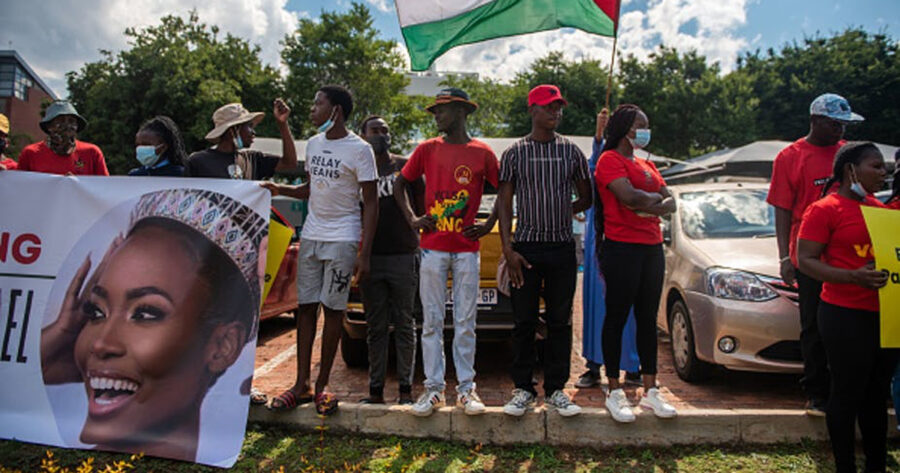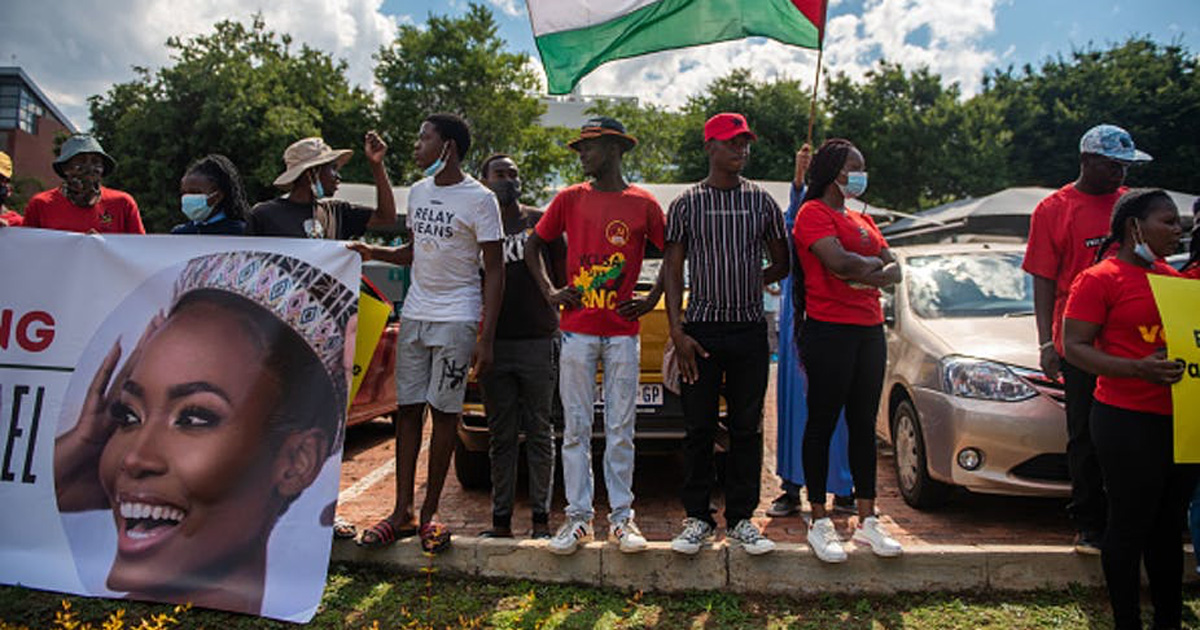
The Furore Over Miss South Africa’s Decision to Compete in Israel: Here’s a Feminist Critique
The furore over Miss South Africa’s decision to compete in Israel: here’s a feminist critique… By Amanda Gouws, Stellenbosch University The participation of Miss South Africa 2021, Lalela Mswane, in the Miss Universe competition in Israel on 12 December has created a furore. Some South Africans support her participation while others have called for her […]

The furore over Miss South Africa’s decision to compete in Israel: here’s a feminist critique… By Amanda Gouws, Stellenbosch University
The participation of Miss South Africa 2021, Lalela Mswane, in the Miss Universe competition in Israel on 12 December has created a furore. Some South Africans support her participation while others have called for her withdrawal.
The Boycott, Disinvest and Sanctions movement in South Africa views Miss South Africa’s participation as tacit support for Israel’s policies toward Palestine, which the movement views as a form of apartheid.
The South African government has called on Mswane to boycott the pageant, and has withdrawn its support for her participation in line with its foreign policy towards Israel. This is a policy of solidarity with the people of Palestine and rejection of Israel’s annexation of Palestinian land, and its negation of the two state policy that would give Palestine independence.
Regardless of the political controversy, and Miss South Africa’s decision to participate, there are also other contested aspects to beauty competitions from a feminist perspective.
Feminists are divided on the merits of beauty pageants. The criticism relates closely to the type of feminism individual feminists embrace. It also reflects a generational divide between older and younger feminists.
I review these perspectives as a feminist theorist who has published widely on feminist theories and women’s movement activism over the past 30 years.
Evolution of feminist views on pageants
Second wave feminism of the 1970s and 1980s (also called radical feminism) was the first significant push-back against patriarchy. It relates women’s oppression to relations of power between men and women. According to this perspective, women’s bodies are viewed as a battlefield on which men exercise sexual and reproductive control.
Patriarchy also inflicts ideals of beauty that exploit women through setting beauty standards that are mostly impossible to reach. From this perspective women’s bodies are objectified and creates the conditions for their exploitation in the pornography industry. This is detrimental to all women.
Second wave feminists accept the binary relationship between women and men and are concerned with how women’s bodies and sexuality are used against them to satisfy men’s sexual desires. Sexual liberation is linked to women’s choices over their own bodies in relation to reproduction. Examples include campaigning for the legalisation of abortion.
The advertising industry, by exploiting sexualised images of women, sets the standards for what is viewed as beautiful.
Radical feminists are concerned with structural inequalities created by the beauty industry. Beauty pageants are, therefore, viewed as exploitative of women’s natural beauty to the detriment of all women. This is especially so for those women who cannot meet these impossible standards, fuelling the epidemic of dietary diseases and body dysmorphia.
Third wave feminists, or a younger generation of the 1990s reject the idea that women are without the ability to make choices. They support women’s choice to participate in beauty contests as a form of empowerment and agency.
They reject the binary distinction between women and men to the exclusion of other genders – such as transgender. They also advocate that women should embrace diverse ideas of sexuality, sexual pleasure and beauty. This is a rejection of what they view as the “victim feminism” of the second wave.
If women want to dress scantily, wear high heels, tight skirts and make-up, that is their choice as a form of sexual liberation. These feminists focus on individual choice and women’s agency, rather than structural inequalities. In South Africa they would view the “slay queen” phenomenon, where women parade their looks and dress very seductively, while pursuing rich men, as this type of expression of women’s sexual emancipation and control over their own bodies and beauty choices.
South African and beauty pageants
The Miss World pageant has been strongly supported in South Africa over many years. But it had a rocky history under apartheid, when only white contestants could compete. In the latter years of apartheid black contestants could compete in their own competition, known as Miss Africa South. This blatant segregation between white and black women for the purposes of the competition showed, in a very visible way, the racist assumptions about beauty that normalise the light skinned, thin, straight-haired appearance.
The lack of integration of these two competitions was widely criticised by other countries and fell victim to international boycotts. That meant Miss South Africa and Miss Africa South could not compete in the Miss World or Miss Universe competitions.
It was this reliance on boycotts (economic, academic and cultural) that significantly contributed to the end of apartheid. These boycott tactics against apartheid underlie the call to boycott the Miss Universe 2021 competition in Israel, because of the belief that international political, cultural and economic boycotts may change Israel’s political policies toward Palestine.
More than beauty
The nature of the pageants has changed over time, from judging women merely on appearance and awarding them for simply being beautiful, to including other characteristics such as education, being articulate and displaying general knowledge. Many candidates who participate now have university degrees.
Regardless of this, the question remains if these competitions reproduce patriarchal norms. Whether contestants are more than just beautiful is not relevant, because in the end it is beauty that determines who wins.
Beauty contests reproduce the patriarchal idea that women should be feminine, groomed to be beautiful from a young age and their beauty put on display. Women who do not meet these standards of beauty, or who choose to reject this type of femininity, are viewed as odd or subversive by those who support heteronormativity.
Beauty pageants also set a certain standard by which most men judge all women. Women become trophies by which men measure their success in heterosexual relationships.
The mere fact that women who participate may not be married, divorced or have born children reinforces the idea of a sexist femininity that supports women’s “purity”.
A social construct
Beauty is not only in the eye of the beholder. Being beautiful is carefully cultivated through androcentric processes that single out a small minority of women, and make their appearances the norm for all women.
This objectification of women’s beauty measured by competitive processes, linked specifically to the body, strengthens patriarchal norms rather than erodes them, whether women have agency or not.![]()
Amanda Gouws, Professor of Political Science and Chair of the South African Research Initiative in Gender Politics, Stellenbosch University
This article is republished from The Conversation under a Creative Commons license. Read the original article.
